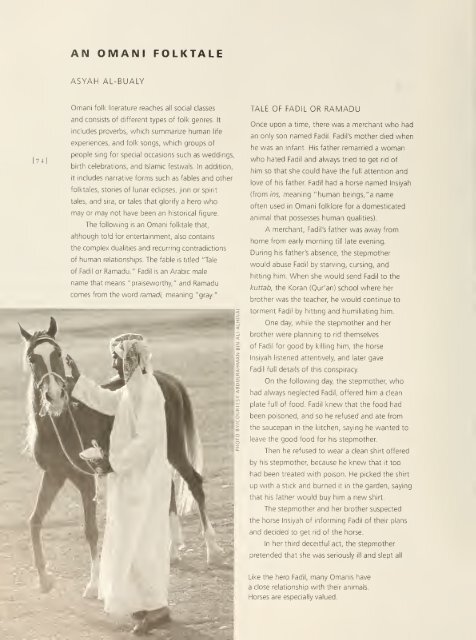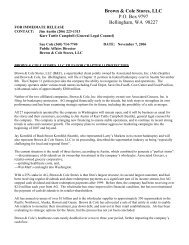AN OMANI FOLKTALEASYAH AL-BUALYOmani folk literature reaches all social classesTALE OF FADIL OR RAMADU74]and consists of different types of folk genres. Itincludes proverbs, which summarize human lifeexperiences, and folk songs, which groups ofpeople sing for special occasions such as weddings,birth celebrations, and Islamic festivals. In addition,itincludes narrative forms such as fables and otherfolktales, stories of lunar eclipses, jinn or spirittales, and sira, or tales that glorify a hero whomay or may not have been an historical figure.The following is an Omani folktale that,although told for entertainment, also containsthe complex dualities and recurring contradictionsof human relationships. The fable is titled "Taleof Fadil or Ramadu." Fadil is an Arabic malename that means "praiseworthy," and Ramaducomes from the word ramadi, meaning "gray."Once upon a time, there was a merchant who hadan only son named Fadil. Fadil's mother died whenhe was an infant. His father remarried a womanwho hated Fadil and always tried to get rid ofhim so that she could have the full attention andlove of his father. Fadil had a horse named Insiyah(from ins, meaning "human beings, "a nameoften used in Omani folklore for a domesticatedanimal that possesses human qualities).A merchant, Fadil's father was away fromhome from early morning till late evening.During his father's absence, the stepmotherwould abuse Fadil by starving, cursing, andhitting him. When she would send Fadil to thekuttab, the Koran (Qur'an) school where herbrother was the teacher, he would continue totorment Fadil by hitting and humiliating him.One day, while the stepmother and herbrother were planning to rid themselvesof Fadil for good by killing him, the horseInsiyah listened attentively, and later gaveFadil full details of this conspiracy.On the following day, the stepmother, whohad always neglected Fadil, offered him a cleanplate fullof food. Fadil knew that the food hadbeen poisoned, and so he refused and ate fromthe saucepan in the kitchen, saying he wanted toleave the good food for his stepmother.Then he refused to wear a clean shirt offeredby his stepmother, because he knew that it toohad been treated with poison. He picked the shirtup with a stick and burned it in the garden, sayingthat his father would buy him a new shirt.The stepmother and her brother suspectedthe horse Insiyah of informing Fadil of their plansand decided to get rid of the horse.Inher third deceitful act, the stepmotherpretended that she was seriously ill and slept allLike the hero Fadil, many Omanis havea close relationship with their animals.Horses are especially valued.***i.
—Iday. She put dry bread and dry date-palm leavesunder her mattress. When her husband returnedin the evening, she tossed and turned, producingsounds like broken bones as the bread and leavessnapped. She was trying to convince her husbandshe was suffering with fever pain in her bonesThere, over the course of several episodes,Fadil was able with his horse's help to save theemir and his emirate from a cruel king whointended to conquer the emirate and marry theemir's daughter by force. Eventually, Fadil marriedthe princess and lived happily ever after.and mumbled to him that the doctor prescribed ahorse's liver to cure her.When the husband hesitated, she immediatelysaid she understood that slaughtering the horseInsiyah would pain his son, who was so greatlyattached to the horse. The husband's responsewas that she was more important than the horse,which could easily be replaced with another.At dawn, Fadil discussed this new conspiracywith his horse Insiyah. They agreed that while Fadilwas at school, Insiyah would neigh three timesfirst when dragged from the stables, second whenreaching the slaughtering area, and the third timewhen being prepared for slaughter.When Fadil heard the first neigh, he askedhis teacher for permission to go home, but theteacher refused. At the second neigh, Fadil askedfor permission to go out for a drink, but theteacher refused again. But on the third neigh,Fadil slipped by the teacher and ran out of theclass to the slaughtering place, where his fatherwas preparing to killInsiyah.The astonished father explained his intentionsto Fadil. Fadil humbly asked his father to grant hima final farewell ride on the horse. His father agreedbut asked Fadil to return as quickly as possible,because of his stepmother's suffering.Fadil jumped on Insiyah and rode away farfrom home. He wrote to his father informing himof his wife's mistreatment. He then returned brieflyto satisfy his father's yearning for him but left againand continued to write more details. The fatherrevealed his knowledge to his wife only when Fadilinformed him of his wife's pretended illness.But it was too late. Fadil had alreadyreturned and left for the third time. He crossedseveral deserts and settled in a wealthy emirate,disguising himself as a poor servant by spreadinggray ashes on himself, which caused the localpeople to call him Ramadu.Such tales share many features with folkliterature from around the world. For example,as much as the Omani tale represents Omanisociety, its structure is not unlike the tales ofmany other nations. But this particular fablearticulates profound concepts connected toOmani ethics—beginning with the namesof itseponymous hero, Fadil and Ramadu.These indicate the boy's embodiment ofbravery, self-sacrifice, and unselfishness.Fadil's departure from home at a veryyoung age reflects an Omani value onadventurous, courageous behavior that facesthe unknown for the sake of achieving a loftygoal. Fadil embodies an ideal Omani, whocan overcome disappointments in life suchas the cruel treatment of the stepmother andher brother, the Koran teacher, who shouldhave been models of exemplary behavior.The Omani people encourage perseverance.This theme is confirmed by a common proverb tothe effect that any action should be performedat least three times to achieve perfection.In other words, repetition is necessary forsuccess. This was expressed in our fable bykey incidents being repeated three times.In Omani society and many others, humannature searches for complete happiness.Therefore, it is not surprising that our fableends with a happy ending in which Fadil andthe emir's daughter share love and marriage.ASYAH AL-BUALY isAssistant Professor in theDepartment of Arabic Literature and Language,College of Arts and Social Sciences, Sultan QaboosUniversity. Born in Zanzibar, she holds a Ph.D.from Cairo University and has published a numberof scholarly and popular articles on literatureand the arts.75IOMAN: DESERT, OASIS, AND SEA
- Page 1:
Smithsonianolklife Festival\Food Cu
- Page 4 and 5:
The annual Smithsonian Folklite Fes
- Page 7 and 8:
—CONTENTSThe Festival's Timely Ap
- Page 9 and 10:
—THE FESTIVAL'S TIMELY APPEALLAWR
- Page 11 and 12:
COMMERCE FOR CULTUREFrom the Festiv
- Page 13 and 14:
[ii]The food concession for the Mel
- Page 15 and 16:
oMiiitbioni.indotal SoundL04.A 1 Sl
- Page 17:
1WELCOME TO THE 2005 FOLKLIFE FESTI
- Page 20 and 21:
Workers harvest artichokes at Ocean
- Page 22 and 23:
—assigned aparticular dish—meat
- Page 24 and 25:
I--IPot Pie Farm manager Elizabeth
- Page 26 and 27: ISustainable farmers such as Eliot
- Page 28 and 29: "IThe numberof programsdesignedfor
- Page 30 and 31: .hadSALAD GREENS WITH GOAT CHEESE,
- Page 32 and 33: w.A>wm:~
- Page 34 and 35: —3 3]OCCUPATIONAL CULTUREThe 2005
- Page 36 and 37: employees, the USDA Forest Servicei
- Page 38 and 39: I[3 6]page book, which could fit in
- Page 40 and 41: ká.!i- .>!mKPA backpacker sets up
- Page 42 and 43: --^i'liunterw eight jihI ...itl jib
- Page 44 and 45: —4-"The essentialpiece isto captu
- Page 46 and 47: I44cutDUTCH OVENONE-POT MEALThomas
- Page 48 and 49: —FUTURE CONCERNS FOR PUBLIC LANDS
- Page 50 and 51: NUESTRA MÚSICA: MUSIC INBuilding C
- Page 52 and 53: plena groups throughout the Northea
- Page 54 and 55: NUESTRA MÚSICA LAUNCHES NEW SERIES
- Page 56 and 57: NUESTRA MÚSICA: MUSIC IN LATINO CU
- Page 58 and 59: "ILos Camperos de Valles son músic
- Page 60 and 61: RAICES LATINASNUESTRA MÚSICA LANZA
- Page 63 and 64: IOMAN: DESERT, OASIS, AND SEARICHAR
- Page 65 and 66: DESERTThe deserts ot the Arabian Pe
- Page 67 and 68: THE FESTIVAL PROGRAMThe 200s Smiths
- Page 70 and 71: 6 8The coiled, leather-covered bask
- Page 72 and 73: 70]COASTAL CRAFTSMANSHIPAND GLOBAL
- Page 74 and 75: [72]Although the oldismaking way fo
- Page 79 and 80: y%aMUSIC AND DANCE INOMANOMAN CENTR
- Page 81: In the southern Dhufar region, al-b
- Page 84 and 85: ecosystems, identification of plant
- Page 86 and 87: 2:00IIIVorkshopFESTIVAL SCHEDULE (P
- Page 88 and 89: Rhythm,Saturday, June 25 (Programs
- Page 90 and 91: )avidi nestMonday, June 27(Programs
- Page 92 and 93: 1:00IIlamFriday, July 1 (Programs a
- Page 94 and 95: )utchSunday, July 3(Programs are su
- Page 96 and 97: EVENING CONCERTSSounds of the Fores
- Page 98 and 99: theRELATED EVENTS[96]Nuestra Músic
- Page 100 and 101: IIDónalas Anderson,Washington, D.C
- Page 102 and 103: 'IEd LiíDmi, Studio City, Californ
- Page 104 and 105: ISudhir Seth, Bethesda, MarylandA g
- Page 106 and 107: 1 if 1 DumberHoneyBeehive Beeproduc
- Page 108 and 109: 1"''NewI >onI Lui\IDon Bustos,Espa
- Page 110 and 111: Ian Barlow, White Bird,Idaho; Woodl
- Page 112 and 113: I 'istnet1Gordon Grant,Corvallis, O
- Page 114 and 115: Kristen Marline, Flagstaff,Arizona;
- Page 116 and 117: I1 ountries,IIHistorie Site, once t
- Page 118 and 119: 1IworksI1 11Istations are vital to
- Page 120 and 121: 1'IenIpanderetas;JCJ Band. Washingt
- Page 122 and 123: Ralph Rinzlersongs are "made" (or c
- Page 124 and 125: I >cmseI VhorahII MiI lameEne Nance
- Page 126 and 127:
|i 2forIIBartlevy1 )oerr;IIParadeSP
- Page 128 and 129:
II AerialIIII1Washington and Jeffer
- Page 130 and 131:
Stack, Bill Stafford, loni Stafford
- Page 132 and 133:
SMITHSONIAN FOLKLIFE FESTIVAL 20051
- Page 135 and 136:
SMITHSONIAN FOLKLIFE FESTIVAL 2005B
- Page 138:
Smithsonian Folklife FestivalSMITHS








